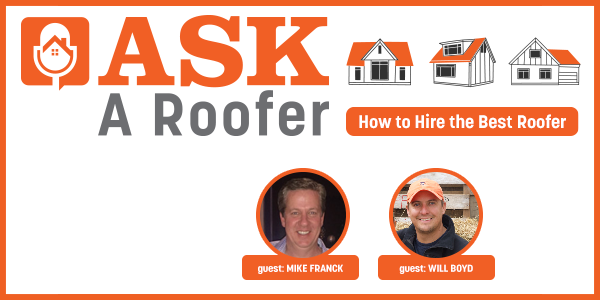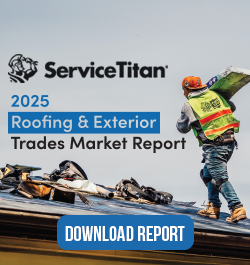Considerations when starting your own roofing company - TRANSCRIPT
December 14, 2023 at 12:00 p.m.Editor's note: The following is the transcript of a live Lunch and Learn with Francisco Serrano from Roofers Going Digital. You can read the interview below or watch it on YouTube.
Julissa Chavez: Afternoon everyone. We are here, Julissa Chavez, Latin program manager with SRS Distribution. Today is our first episode in a new series that we are putting out with our partners, The Roofer's Coffee Shop, which is the first digital publication in the world in the roofing industry, so if you are not part of Roofer's Coffee Shop, join us. And today we have a guest, we are going to do a series of lunch and learns in Spanish. And today our first guest is Francisco Serrano, with Roofer's Coin Digital. I want to give him an introduction, introduce Francisco to you, for those of you who don't know him. He's a great brother with me, a great friend. So today I have him as a guest in the first lunch and learn that we are going to do for you in Spanish. Francisco, welcome.
Francisco Serrano: Julissa, thank you so much to SRS and Rufus Coffee Shop for inviting me. I'm really excited and even more excited to be the first guest. To be able to help the community, the Latino family, is the goal of these programs. And if it's going to be to help, count me in. So, we are very excited. And a little bit of my story. I now have a digital marketing agency focused on the roofing industry, but I started selling commercial roofing, selling products, something similar to what you do. I started selling products, I discovered that you could sell a lot of things through digital media in the roofing industry and that's how Roofers going digital was born.
Julissa Chavez: Francisco, it's an honor to know your story, because I know that many of us never dreamed of being in the roofing industry, right? A lot of us have different industries that we come from. So, I completely witness that when you start in roofing, you always go back for one reason to the other. And well, okay. Today we're here with the intention of having this lunch and learn with you and talking about three learning objectives. In this industry world there is a lot of movement with the Latino market, so today there are a lot of people that are in the industry as a subcontractor, as a business owner or many of you are working with large companies. So today we are going to start with the first learning point and the first point that Francisco and I are going to talk about today is to do a personal internal analysis. Where are you, where are you at in your life. And with that we are going to invite Francisco to give us his opinion on that self-check that you have to do first personally and where you fit best in the options that exist.
Welcome, Francisco.
Francisco Serrano: Thank you very much, Julissa. Look, yes, that is very important, what we are going to talk about today. And I like to communicate it a lot in my show, because right now with everything on the Internet we are at the stage where you see the Instagram and everything? It's open your company, be an entrepreneur. And the reality is not like that. You can work in a very good company, you are going to do a thousand things, you are going to get a thousand benefits, you are going to learn a lot and you are going to do very well without opening your company. Or if you want to take a risk, open your company, but you have to take into consideration that it is going to be difficult, you are not going to sleep, you are going to have to be prepared. So, that internal analysis that we must have and take into account, I think that is the most important thing about who we are, what we want and where we want to go.
We have a family, we do not have a family to support, we want to continue learning, so you go to a company. So, I think that this, knowing internally what your strengths are, there is a very good analysis, SOR Analysis or SWOT analysis, in Spanish, which is very useful to analyze internally and see where you stand in order to make good decisions.
Julissa Chavez: Wow. So, in the world of industry, for example, Francisco, you came in here, not as a subcontractor, but in sales. Can you talk a little bit about how you got into the industry and into sales?
Francisco Serrano: Yes. Look, Julissa, I opened my company three years ago, but for me, the decision that I came to do this is because I spent seven years working in corporations in Mexico, at Nissan and BMW. I was a consultant. So, there I learned a lot and suffered a lot because I knew nothing. I moved here, I got to know the roofing industry, I became a salesman to sell products and I learned a lot more. And from there with ten years of experience in different areas such as sales, which is what was going to make me money, a little bit of finance that I learned there, legal, well obviously nothing, but in team management and leadership, that was what helped me to develop these strengths, which I will be honest, despite this experience that I had, then I went to college, I have a master's degree, it is still very difficult for me and there is a lot of stress. And I can assure you that all the owners that you know, Julissa, are having these situations.
So, a lot of times, even if you have the experience, you can work, you can continue. If someone has the goal, Hey, I want to grow the industry, I want to help people, even if you work at a very good company, you're still going to be changing lives and helping people.
That's not to say Not only business owners do that.
Julissa Chavez: I love, love, love it because I also came into the industry from the sales side, right? And one of the things we want to talk about today is when people typically talk about the roofing industry, you imagine, I'm going to be on the roof, nailing shingles. And that's really the subcontractor's job. You have to talk a little bit about the subcontractor and the role that the subcontractor does. With this industry, obviously labor is mostly Latino, so if you're a subcontractor, there are always job opportunities for you and your labor crews when you work with or subcontract with another company.
Francisco Serrano: Yes. Yes, look, Julissa, I think you just touched on a super important topic, the subcontractor, because I think that 90 percent of Latinos or Hispanics in the United States are installers or are in labor work, which is not to say that it is wrong, but you have to know when to move at that stage, because many say Hey, I am. My installations are the best, I'm the best installer. Yes, but 50 percent of the installers in the United States are good. In other words, that is not a differentiator. That's why once, and there are also many schools, Julissa, and you know many that teach you how to get out of that stage and leaving a manager there so that you can grow to the next level and be able to, mainly, change your life, but know what you have to, as they say, leave the gun and move to the next areas which is sales. A lot of times developing all these areas of sales and marketing, which is going to...
Project management, leadership, are the ones that are going to help you develop these, are going to help you grow to the next level as a contractor. And a lot of times, I was talking to a business owner yesterday, was you change your target market, your target market.
Because when you're a subcontractor, a lot of people want to sell to the contractor. But when you're a contractor, you go to the end customer. I think that's one of the most important, knowing who you're selling to, where you are and who you want to sell to, to see if you want to be a subcontractor or a contractor.
Julissa Chavez: I love it. Well point, good point Pancho, because I think for everybody out there, who are subcontractors, who are listening to us today, I think it's a phenomenal job. I think there is a lot of opportunity for gain on the labor side. We just want to talk a little bit about tips as a subcontractor. If you manage teams, well obviously, one of the tips there is that basically you are going to have to have leadership, as Francisco says, because if you are going to motivate, if you are going to move different people, then there is the opportunity to invest a little bit of time in your leadership, in your influence, in how you can get people to follow you and be a better leader if you are on that subcontractor side, because you have people who are working there for you. I know there's a lot of opportunities, I've met some really great subcontractors that make over millions of dollars just with the labor side and the relationships that you've already established with the builders, with roofing companies that are big, that have jobs.
There's a lot of opportunity there with the employee relationship side and also with your networking, as you know, Francisco, networking is everything.
So, I don't want to not touch on the issue that if you're going to be the subcontractor, if that's the side where you are, you have to be a motivator, you have to invest in leadership and relationships so that you can have more opportunities for your guys and girls, who are your workers.
Francisco Serrano: Two more things, sister. In processes so that people can follow them. And at the same time, all this, if you want to be a subcontractor, it's perfect, but it has to be established in the plan. It's part of the plan that you already did when you did your internal analysis.
Julissa Chavez: And make sure you have the insurances you have to have, right? Like workers' comp or liability. These are issues that are super important as subcontractors, so if you don't have workers' compensation or liability, please make sure you have it, it's very risky to be a subcontractor and not have the insurance that you need to have to protect you and your company as a subcontractor and your guys as well. Because we know that in the roofing world, we are really primordial, the falls are the ones that affect us the most in this industry, so it's recommended that if you are a subcontractor, make sure you have your insurance and sharpen your axe with leadership and your networking connections to get more job opportunities. And also, Pancho, I don't know if you want to talk a little bit about Labor Central and make sure you are connected with this partnership, we have with them.
Francisco Serrano: Yeah. Look, you know what, Julissa, one of the main opportunities that I'm getting, that Hispanic contractors, subcontractors, they come to me and say Hey, I don't have a job, I've been doing this for 30 years and for the last few years I haven't had a job. And I think that's one of the main opportunities as sales, but thanks to a lot of leaders in the industry, they are creating this, so they can connect the subcontractor to the subcontractor with the contracts. Okay. That's right, Julissa. I think this thing that you just talked about Labor Central, I think sales, one of the main opportunities for the subcontractor is sales. But already, what's the good thing, that there are already a lot of leaders that are seeing this opportunity and that are getting to connect these two parties, which is the subcontractor and the contractor. Why? Why is this happening? Because the markets are shifting. Fab, everybody that's listening to us, if you're stopping selling like you used to, it's because the competition is growing, the markets are changing and that's what we're saying right now, that you've got to get to the next level.
If you are all day long focusing on installation, it's going to be very difficult.
And I think with Labor Central, what do they do? They connect their contractor with contractor so they can give you work. There are a lot of them. We can have a discussion, Julissa and I, about ways to get work for these subcontractors, but certainly Labor Central has to check it out. We are going to leave the data here at the show so they can check it out, sister. That's a very good point.
Julissa Chavez: And it's free at the end of the day. That is, for subcontractors, if you are not with Labor Central today, you are losing opportunities, because for the subcontractor it is free to enter your profile, to enter what capabilities you have of your guys, of your crews, to find other opportunities in other states. Super recommended. And we have Labor Central, who is going to be our guest, Jessica at the next lunch and lunch that we are going to do, and we are going to apply with her a little bit more about that platform and benefits of being part of Labor Central. But well, I know we've talked a little bit about subcontractor, and I want to leave a little bit of time for the second option in your entry into the roofing industry. And the second learning objective or learning objective is when you consider working for a large roofing company that's already established. Let's talk a little bit now. We talked about being a subcontractor yourself. Now we want to talk about the benefits and considerations that you have to have when you work for another company.
So, Francisco, what are your thoughts when I as an individual go and work with a large company on Ruffy's side, whether it's residential or commercial?
Francisco Serrano: Yes, look, working in a company I think is one of the best decisions someone can make. Why? Because you're already on another level seeing things that you're hardly going to see when you're an installer. You can, because when you work in a company, what are you going to learn? They're going to teach you how to sell. They're going to teach you about the customer, how to treat the customer. A little bit about finance, how to run the numbers, a little bit about marketing, a little bit about being more professional and being an executive. Being an executive why? Because the market that these contractors are going to is very different, it's a homeowner. And here it's very important to keep both markets in mind. When you're a contractor, you're selling to a contractor who speaks your language. You, when you work for a company and you sell to a homeowner, it's totally different there. He doesn't care if the technical stuff. They want a language, they want to make a relationship, they are looking more for the relationship.
And I think there are very good companies that if you focus on working with them, you even become a partner working with them and you make more money than being a business owner, which is going to be the next step we are going to talk about.
Julissa Chavez: I love it, Francisco. Considerations with working with another company, for me I also want to add that, let's say, for example, you started as a subcontractor, do you want a new apprenticeship, a mentor that can teach you how to run a roofing company and do sales directly with the owner. So, as you say, I think it's important, because as a subcontractor, if I put on my subcontractor hat, I'm selling myself to roofing companies or builders or other companies that do construction. I'm selling my labor services, which is a sale. And as you say, when you work with a large company, let's say you're on the sales side again, now you're selling to the owner. So, it's a different sale, because selling as a subcontractor is, hey, we're here, I've got so many guys, I've got so much muscle and we can do these different types of roofing, right? Yes. And it's necessary, it's easier like selling that, they focus by price, by square footage, whatever, it depends on what market you're in.
But on this side, when you work with a roofing company, you're going to learn how the process of selling to the customer, creating that experience to the homeowner, because the homeowner changes their roof on average 1.7 times for that person's lifetime.
That means that mostly people experience the process of a roof change once in their life, that's just an unfamiliar process, it's a different process and it's like I think, the biggest difference in the sale that you're going to have if you're a subcontractor, as opposed to working for a large company, in my opinion.
Francisco Serrano: And you know what also, sister, I think that one of the positions, once you are already very good at installing and you know all the technical stuff, I think the most important thing is to focus on sales. To work in a sales company, to go out and knock on doors and to know the customer's objections so that you become more professional and become a person that when you can jump to the next level, you know, you have already knocked on 1000 doors, 2000 doors, I know all the objections. Also something very important, if you have a family, if you have a family and your objective is that they are happy and that they enjoy you, I think that is the good thing, it is the great thing about working with a company that you have more, more, you don't have so much stress and you have more time to do your things. And that too, and many people will say No, but I want the money. Yes, but not all people want the money.
Many people want to live well. And now that I am a business owner and sometimes, I say Hey, I mean. I mean, don't think there is a huge difference between being a business owner and working in a family company.
And I say it from the bottom of my heart to you. Don't believe how they are being painted out there, it's not always like that. Yes, try it. Of course. But then, consider all this that we are talking about right now, the pros and cons, and put it in writing. Pros and cons of working in a company, good company, as opposed to working on my own.
Julissa Chavez: Okay, perfect. And with that, Francisco, I believe that I personally am now in situation two of the benefits of working with a large company. Obviously, I have been in the industry since 2014 working with Ruffy companies that are extremely successful. I know processes, I know what the challenges are and the opportunities that exist as an owner of your own business. But personally, many people ask me And, Julissa, when are you going to open your own company and this and that? So, for me, as you say, for me my flexibility is the most important thing right now. In my time, we know that business owners and business owners is something like a marriage, which is more married to the business and to your husband or wife, right? It's always there attached, you can never detach, limitedly, because it's your baby, it's your business. So, I find myself in that situation that I work with SRS and I'm happy where I'm at. Maybe in a year, in five years from now, I'm going to change where my life is at and say, you know what, now I'm ready to do my own business and do the show the way I want to do it, based on my experience that I have working in this industry.
Francisco Serrano: And I think, Julissa, that's perfect. And I think we are now going to move on to point number two, but what is important, and I reiterate is that it is part of the plan and of your life goals. I mean, you already have it very clear. It is not like from one day to the next you already made that decision. You know, you do that internal analysis very well, it is key.
Julissa Chavez: And well, for many of you who are subcontractors, obviously there are different challenges and opportunities. For example, subcontractors are easier because you meet Latino people, people who are looking for work. So, it's a little bit easier to manage if you are entering the industry, if you don't have experience, because you know that as Latinos, we are the hardest workers. You always have like this thing that leads you to be comfortable in entering the industry, but as we say, obviously you get to the point where your self check leads you to what's next for me. And we were talking about the second point of working with a large company and the benefits that you can learn from that company. As you say, let's assume we're going on the journey that I was a subcontractor. Now I'm ready to work with a large company, grab the processes, learn the selling directly to the owner, that experience, try to have a mentor as well. One of the things we haven't talked about, Pancho, is mentors in this industry and the importance.
I want to touch on that topic of mentors before we go to the third learning that we're going to talk about.
Francisco SerranoDefinitely self-preparation, mentoring, books, podcasts. I think that that, that I think, sister, you do that while you were a subcontractor and you worked at this company. Because if you don't do it then, if you don't water it and if you don't invest. Hey, I just have more time. Invest it in learning. Don't worry about it now, the money's not going to go away, but go to all the classes. Call Julissa and go to all the classes she has that time. Go to all my podcasts. How many schools aren't there out there? Latinos in roofing, training Latinos. You have to go to all of them. I tell them that, Julissa. Before you open your company, I hope you've seen all my podcasts, and you've talked to Julissa, and you've gone to all the schools and had a mentor. No doubt about it. I love it. When you're a business owner. Well, if you want to move on to the other point, because right now it goes.
Julissa Chavez: Yes, it's what's next, it leads us to what's next. As a business owner now, to the considerations.
Francisco Serrano: What happens when you're a business owner and you're going to keep learning? That's a no-brainer. But you're not going to have that much time. Either you sell or you start learning. And in the first years, you are going to say no, I can do both. The first years. Now ask me if I have time to learn and go around solving problems. It is very difficult. Obviously, consider that once you are a business owner, you will have to work 12-14 hours. Right now, I have not been able to rest for 14 days. That is, since you work two Saturdays and Sundays. I mean, and the truth is, I made you say, "Oh, I love it. No, nobody who does that says they love working so much.
Julissa Chavez: And obviously, as a business owner, which is the third consideration, we're talking about subcontractor, working with a large company. Now let's assume that you've learned the process of selling to the owner, you have a mentor that gave you your blessing, they're going to say, you know what, I'm going to be here if you get stuck, whatever. It's very important to have that relationship with someone in the industry, with companies that you've worked with, because all the stumbling blocks that you're experiencing, typically, they've been through them as well. So, that's why everyone who is watching us, don't burn bridges with companies. Remember that this industry is very small, so the fight you had yesterday, fix it, work on it, try to always bring that relationship with people in the industry, because I can't put importance on it, I can't give it minimal importance, because it's very important to have a mentor and to have good relationships. If you are going to be especially a business owner, why not everything you are going to know.
Francisco Serrano: As Francisco says. Exactly. And sister, you touched on a very important topic, that if you make a mistake, you have to fix it or you have to assume the consequences, but that is why it is important to be one before, because I have heard a lot, sister, that people tell me that out of all my installers, I only use 20 percent, because 80 percent, most of them did something wrong and they stopped answering the phone. But the problem is that you burn those bullets, and the problem is that the industry is huge, but no, the industry, you keep burning and burning. That is, it is key to be in a niche or in an industry focusing on roofing. You need to be very professional and irresponsible. You fixed it, you're going to have to do it. And I think that, sister, that's what happens when you're a subcontractor, you work for a company and you're your own business owner. But it's good that you touched on it, because it is one of the things that really touches me the most and hurts me the most in my heart.
I mean, we have a very good reputation, but then they don't answer me. That kills us all, all of us as a community.
Julissa Chavez: And I also want to touch on a very important topic. In this industry, the statistics tell us that typically someone who is opening a roofing company, at the beginning, those companies that are new, in two years or for some reason they have to close that company. So, when you want to take out a line of credit with distribution, you want to get certified like this company is certified with the supplier that you choose, right? For roofing products, they're always going to ask you how long your company has been established. And typically, you have to have two years that you've survived as a roofing company to be considered for certifications or high lines of credit or whatever, right? So, one of the things that is a little bit of a problem that I see a lot with people who are starting out is cash flow management. Let's talk a little bit about that, Pancho, because when you do a roof, that is, you are receiving checks of 20,000, 30,000, 50,000 dollars from the insurance company, you do work with that insurance.
So, you have so much money coming in that you say, Oh, we are going to buy a car, a boat, a new house, we are going on vacation. I want to touch a little bit on the importance of managing cash flow when you are an owner or owner of your company. Yes.
Francisco Serrano: Sister, I think you just touched on a very important point, cash flow. Fam, what is cash flow? It's when money starts coming into your company, which is what a lot of people do. People think that money starts coming into your company and it is already yours, it is already profit. Fam, that is not profit, you owe that to the government, you owe that to your employees, you owe that to your team. And what it is not for, it is not for you to buy a new van of the year and I think that is one of the main opportunities we see in the business, all the subcontractors are driving around in a new van of the year. Fam, I know, they need it for the job and it's also a rider, it's a tool, but that doesn't mean that. Why don't you grab the 2015, the 2014, that's working. In fact, a lot of the stories of successful contractors put their cars from when they started, and they were all up to and stuff like that.
So, that money that's coming in is not even for you, it's not even for the pot. And it's also very important that you have a QuickBooks.
And the most important thing is that you have an accountant. Nothing that I have the money in the bank. In other words, the money comes in and there it is in the bank. That is one of the main mistakes as a business owner. And I can assure you that it happens to us Hispanics that the money comes in directly and there it is in the cash box and that is my money. You have to have all your financial reports not done by you. For example, that cash flow goes to your accountant, that cash flow goes to your lawyer, that cash flow goes to your insurances, your insurances. For example, sister, I have been here for four years, three years since I opened my company and I have not even bought a car. Imagine that. I live with my wife's car for the same reason that I have not taken it out. I earn what I live on, but for the same reason, because that money is not mine. And what many consultants recommend is that you don't take the money out for the first five years of the business.
Why? What happens? How is your business? Your business is like a baby. If you start giving it food, which is money, which is cash flow, it will start to grow big and strong.
But if you take away the baby's food, it will even die. And the same with the business, it will die because you have no way to pay. And then, what happens? You close your business and the next month you open another one with another name. And that is what Julissa was saying, the companies that are checking up on you. And it seems to me, Julissa, that the companies that check you for two years are the good ones, the ones that really want to support you. From there, many of them give you even more time and make you a business plan and ask you a lot of things. But yes, don't take money out of the business, pay yourselves to live and don't go around spending on things you don't need. Everything used and don't touch that money.
Julissa Chavez: And lastly, as a tip, when I worked with companies that are very large, I want to talk a little bit about We were talking about cash flow. One of the things that they did, different than other companies, was to manage cash flow by paying their labor first of all, because without labor, we can sell jobs every day, but if nothing comes in and they put the ceiling on it, nothing gets done. Yes. Pay your labor, have good relationships with your working crews, pay your distribution. On the distribution side we get the material to your job, we make sure it would be on time for the day of the deconstruction that they are going to replace that roof. One of the companies that was a larger customer of mine, when I was selling materials in the Atlanta market, they would every Friday pay for everything they put out. Not every month, because typically when you have a line of credit with distribution, you have to pay 30 days. No, these guys knew the importance of having distribution and having this line of credit ready for what they needed.
So, they would pay them every Friday, they would make a payment to the account for everything they had taken out that week.
Always try to take care of your crews, pay them well, treat them well. Yes, and always have a good relationship with distribution, because you can go pick up your material every day at Home Depot and Lowe's, but you have companies like SRS that bring you the material, that help you work on multiple jobs without having to go pick up your material. We're there making sure it's on time so you're not behind on your production, right? But if you don't have a partner like us, then it's going to be difficult for you to grow in your life as a roofing company owner if, as Francisco tells you, you're going to lack time and then you need alliances with the manufacturer to certify you for distribution and with your labor crews, which is very important. And with this I want to leave the topic of advice there. I want to talk a little bit about the good things and the benefits of being your own entrepreneur and owner. What can you tell us about that, Pancho?
Francisco Serrano: Now, obviously, you are going to hear, sister, that I tell you, many things on the negative side, but on the positive side there are a lot of things. If you like to change lives, you are going to change your life, your family's life, but also that of your family, who are your employees and your labor crews. And imagine how many of those people who don't have jobs, I tell you, they come to me and hey, I need a job. How many of those people are you going to employ? How many are you going to give them jobs? The other benefit, I have people in Mexico also that help me with many things. I am changing lives in Mexico. These people would never have been able to work in an American company like mine and we are also changing their lives. Obviously, afterwards, when you start making good financial decisions, if you make good financial decisions, paying your distribution, paying your employees, it will work out for you.
It is going to come out for you, and I can assure you that you are going to live well. I am not saying that the money is wasted. If you invest it the right way, you are going to have an It's not financial freedom, but you're going to pay for it yourself and you can be this...
In other words, you are going to live well without any doubt. When you grow up you will also have time. Not the first three, five years, which is the most difficult, no. But once you start to mature, which is when you start to see the light at the end of the tunnel. But once you start to mature, which is when you start to see the light at the end of the tunnel, you will have more time. What is another thing you can do? I have other points here. You can have, you can control your time and your flexibility. You can fill yourself personally. You personally are going to know that you succeeded as an entrepreneur or as that goal that you had in your plan. Once you put it together, you are going to have a lot done, you are going to be fulfilled internally because you have achieved it. You've made it, even though the problems are going to be there, those problems are always going to be there, but the ultimate goal, which is to help people, to have more time.
And to have more time and to be able to help others and more than anything else the owner of the houses. To be able to help the market, which is the owner of the houses. When they arrive and thank you, that with hard work they were able to comply. Imagine, a homeowner can barely put a roof on his house. He does it.
It was very difficult for him, and you helped him with that. You become part of his family. They invite you. If you do a good job with your clients and your employees, they will invite you to their parties, they will invite you to their daughter's baptisms, you will be everywhere, and it feels great when people love you because you helped them without anything in return. Many times, everything will come to you without you giving anything in return, so don't go around waiting, Fame, so what? I gave to him, and he gave me nothing.
Julissa Chavez: Well, and to close the segment with the benefits of being your own entrepreneur, we talk about flexibility of time that you have your schedule, your flexibility. There are a lot of benefits financially, as Francisco said, after you go through the first few years of training, obviously it's enough to have your reward. And the other thing is legacy. We never talk about legacy, Francisco, which is.
Francisco Serrano: The last thing I would say.
Julissa Chavez: That the legacy like having your own name, having your own company, leaving that company to the next generation, selling that company for another company maybe or it's also like the legacy of the benefit of being your own entrepreneur, that you can change lives, like you said, as much as the employees of yours with the job opportunities and the owners with helping them with the bigger thing which is their house, right? But also, the legacy, I think it's like the ultimate I would say the ultimate benefit of being that business owner, because nobody's going to take it away from you and it's your name at the end of the day.
Francisco Serrano: Sister, imagine what a good point the legacy is. Imagine coming from a village. Let's say, I am from a village there in Mexico. Imagine coming from or from another, anyone else you come from the village. You crossed the border, you opened up all the streets, you went through all these installer caps, you worked in a company, then you open your business, you're successful. Do you think people are going to forget about you? Obviously not. You are going to be part of the history of that town and of your family much more. Your family will not lack anything. If you know, I mean, we are going to get into family matters, but if you do a good job with your children and everything else, they are going to have, they are never going to suffer because, oh, I don't have a job. There they will have the company that you, as a business owner, they will have your legacy that you built.
Julissa Chavez: Well, friends and friends, today's segment of the first Lunch and Learn on considerations in the roofing industry is over. So, I want to thank Francisco Serrano for being with us and being our first special guest. And I want to invite them, Francisco, to invite them to follow you on your podcast. I don't know if you want to give a call.
Francisco Serrano: Yes, let's go. Yes, yes, thank you very much, Fam. On YouTube, Rooferss going Digital TV, every Thursday we are uploading a new episode with a new leader and all the episodes are in Spanish. First, we started, it was mixed Spanish English, but I saw the need. I was doing it in Spanish English, but I saw the need that the Hispanic market was the one that needed more. So, now Rufus going Digital TV is exclusively The interviews are in Spanish. We are already on interview number... We're on number 40 right now. So, it's great and the information that these people are sharing with us is great. Most of them are business owners or very top executives in the companies they work for. And they are the main example of how they are breaking it in companies, and they are also employees, including subcontractors, who have been able to do it. So don't miss out. Roofers going digital sees you and in all the social networks in Roofers going digital we are promoting this from episodes.
And also, my marketing agency, Roofers going digital, if you have any questions, even if you want to send me a message, any help you have, I'm going to help you and I'm going to connect you. If I can't help you, I'm going to send you to people, because I'm not going to be able to help you, but I'm going to know who can help you for that.
Julissa Chavez: Thank you, Francisco. As kind as always. And well, guys and gals, on the side of us, please, if you don't have access to Roofers CoffeeShop, become a member. It's totally free. You can browse Roofers CoffeeShop in Spanish and English, so don't hesitate to add yourselves to that digital publication for information and news. And our lunch and lunch series that we are creating this year. And on the SRS side, well we have our SRS Distribution. Com, we have our SRS tab for Latinos. If you want more information about the Latino program, we have our mission and the whole value proposition to being an SRS customer or please, more information about Francisco, about SRS and Roofer's CoffeeShop for you today. Thank you for your time and see you next time. Thank you, Francisco.
Francisco Serrano: Thank you very much, sister, and thank you very much Roofer's CoffeeShop and SRS Distribution. Pease. More information www.carrera.com.























Comments
Leave a Reply
Have an account? Login to leave a comment!
Sign In